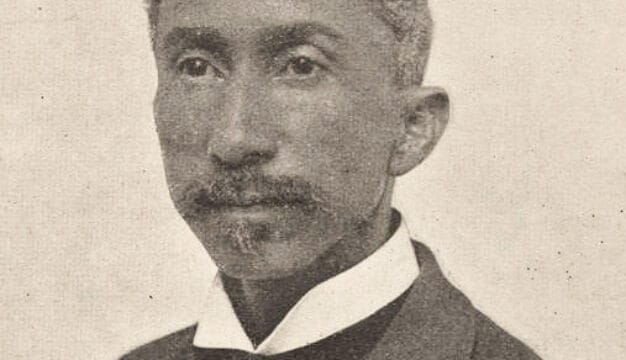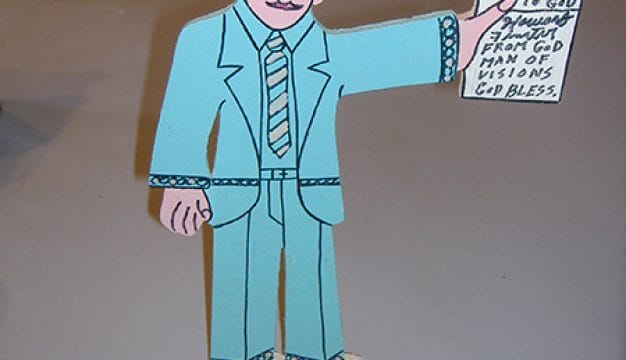Alexis Herman
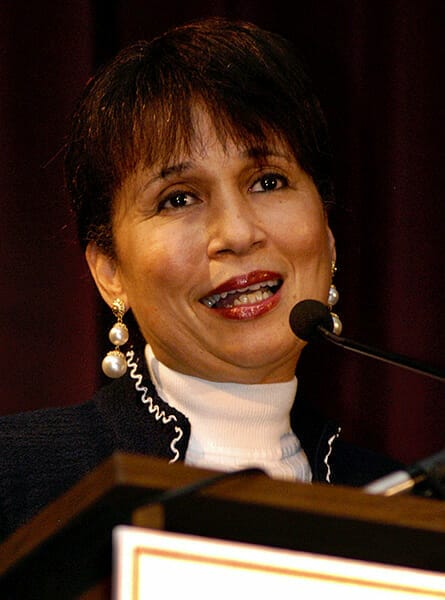 Alexis Herman
Mobile-born Alexis Margaret Herman (1947- ) is thus far the only African American to serve as the U.S. Secretary of Labor, which she did under Pres. Bill Clinton. Her years of involvement in employment training programs on behalf of women and minorities led her to that position, in which she oversaw the passage and implementation of reforms to the nation’s job training system and an extensive expansion of the workforce. A long-time Democratic insider, she was reported to be considered for a top position in 2000 presidential candidate Al Gore’s White House. Now generally working in the private sector, Herman sits on a number of corporate boards, advises companies on their hiring policies, and is engaged in philanthropic activities.
Alexis Herman
Mobile-born Alexis Margaret Herman (1947- ) is thus far the only African American to serve as the U.S. Secretary of Labor, which she did under Pres. Bill Clinton. Her years of involvement in employment training programs on behalf of women and minorities led her to that position, in which she oversaw the passage and implementation of reforms to the nation’s job training system and an extensive expansion of the workforce. A long-time Democratic insider, she was reported to be considered for a top position in 2000 presidential candidate Al Gore’s White House. Now generally working in the private sector, Herman sits on a number of corporate boards, advises companies on their hiring policies, and is engaged in philanthropic activities.
Herman was born July 16, 1947, to Alex Herman, a politician, and Gloria Caponis, a teacher. Alex Herman reportedly successfully sued the Alabama Democratic Party to allow blacks to vote in the party’s elections and became a ward leader. Alexis graduated from Heart of Mary High School in 1965. After a short stint studying at Edgewood College in Madison, Wisconsin, she returned to Mobile to attend local Spring Hill College, before transferring to Xavier University in New Orleans. There, she earned a BA in sociology in 1969 and after graduation worked for Catholic Charities in Pascagoula, Mississippi, developing employment and training programs for underprivileged youth and improving shipbuilding apprenticeships for unskilled African Americans. Herman then moved to Atlanta, Georgia, where she worked with employment and training programs targeted toward women and minorities. In 1974, she served as the Queen of Carnival for the Mobile Area Mardi Gras Association in her hometown’s annual celebration.
Active in the Democratic Party, Herman met presidential candidate Jimmy Carter while working for his campaign and was later appointed by Pres. Carter to head the Department of Labor (DOL) Women’s Bureau, which promotes employment opportunities for women. She was the youngest individual in that position at that time. She served throughout Carter’s presidency from 1977 to 1981 and was instrumental in urging Delta Airlines and Coca-Cola to hire more women in their corporate offices. Later in the 1980s, she formed her own consulting firm, A. M. Herman and Associates, which provided advice on minority hiring rules.
Later, Herman worked under Democratic National Committee (DNC) chairman Ron Brown and was appointed chief executive officer of the 1992 Democratic National Convention, at which Arkansas governor Bill Clinton and Tennessee senator Al Gore were chosen as the presidential ticket for the party. From 1993 to 1996, Herman was an assistant to Pres. Clinton and director of the White House Public Liaison Office, which oversees relations and contacts with public interest groups.
Herman was nominated for Secretary of Labor in late 1996 after Robert Reich stepped down. She was initially opposed by congressional Republicans and some elements of organized labor, the latter because of her inexperience in dealing with labor issues. Senate Republicans held up her confirmation hearings to pressure the Clinton administration to abandon an executive order that would have mandated federal agencies to consider awarding large construction contracts to companies with organized labor. Confirmed by the Senate in May 1997, Herman was soon involved in settling a workers’ strike at UPS in favor of organized labor, and earned praise for her efforts in ending the walkout.
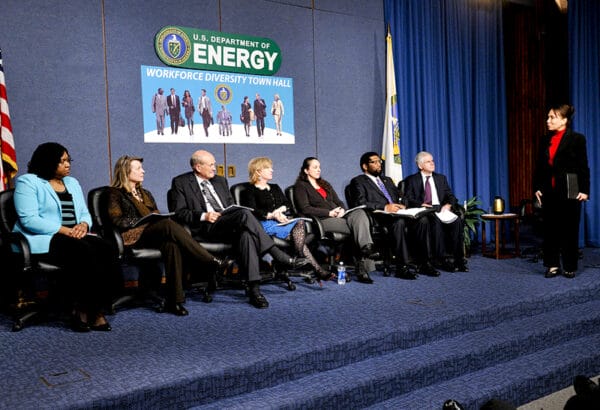 Alexis Herman at Diversity and Inclusion Panel
Also during her tenure from May 1997 to January 2001, Herman helped reform the public job-training system with the passage of the 1998 Workforce Investment Act. The law aimed to consolidate funding sources and services into “one-stop” career centers, provide local areas with more control over spending, and give users more input in obtaining job search and retraining services. In addition, the law intended to implement more stringent accountability measures and provide services to individuals with jobs. Herman also oversaw the implementation of the Youth Opportunity Grants program, which directed funds to impoverished areas to improve employment and education for local youth, DOL’s involvement in welfare reform, and record low unemployment. Furthermore, she spearheaded efforts to improve child labor conditions abroad by pushing for stronger international labor rules and increased funding to enable children to attend school instead of going to work to support their families.
Alexis Herman at Diversity and Inclusion Panel
Also during her tenure from May 1997 to January 2001, Herman helped reform the public job-training system with the passage of the 1998 Workforce Investment Act. The law aimed to consolidate funding sources and services into “one-stop” career centers, provide local areas with more control over spending, and give users more input in obtaining job search and retraining services. In addition, the law intended to implement more stringent accountability measures and provide services to individuals with jobs. Herman also oversaw the implementation of the Youth Opportunity Grants program, which directed funds to impoverished areas to improve employment and education for local youth, DOL’s involvement in welfare reform, and record low unemployment. Furthermore, she spearheaded efforts to improve child labor conditions abroad by pushing for stronger international labor rules and increased funding to enable children to attend school instead of going to work to support their families.
The early years of Herman’s term were marred, however, by charges that she took bribes from or solicited illegal campaign contributions from an African businessman while working in the Office of Public Liaison. She was cleared of any wrongdoing in 2000 by an independent council appointed by Attorney General Janet Reno. She remained active in Democratic circles after leaving office and was part of Democratic presidential candidate Al Gore’s transition team; she was even considered a possible White House chief of staff, but Gore lost the election to Republican George W. Bush.
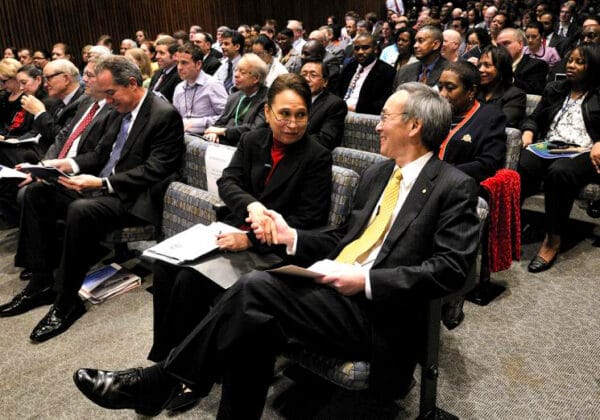 Alexis Herman and Steven Chu
In 2004, Herman served as co-chair of John Kerry’s transition team and of the DNC rules and bylaws committee, which wrote the procedures and regulations that governed the 2008 Democratic National Convention and the awarding of delegates. During the 2008 presidential election, the committee initially barred Florida and Michigan Democratic delegates from voting at the 2008 Democratic National Convention because those states had moved up the dates of their presidential primaries. Ultimately, the committee agreed to allow those states’ delegates to attend the convention, but they were given only a one-half vote per delegate. She was also co-chair of the Bush-Clinton Katrina Fund organized to coordinate private relief efforts along the Gulf Coast.
Alexis Herman and Steven Chu
In 2004, Herman served as co-chair of John Kerry’s transition team and of the DNC rules and bylaws committee, which wrote the procedures and regulations that governed the 2008 Democratic National Convention and the awarding of delegates. During the 2008 presidential election, the committee initially barred Florida and Michigan Democratic delegates from voting at the 2008 Democratic National Convention because those states had moved up the dates of their presidential primaries. Ultimately, the committee agreed to allow those states’ delegates to attend the convention, but they were given only a one-half vote per delegate. She was also co-chair of the Bush-Clinton Katrina Fund organized to coordinate private relief efforts along the Gulf Coast.
In 2000, Herman married Washington D.C.-area physician Charles Franklin; he died in 2014. Herman continues her consultancy business in Washington, D.C. and has an active public speaking schedule. From 2001-2006, she was chair of the Human Resources Task Force for Coca-Cola and has served on the Diversity Advisory Board for Toyota as well as the boards of other companies and is CEO of New Ventures Inc., a corporate consulting firm. In 2010, Herman joined the board of the Clinton Bush Haiti Fund, established to raise financial donations after a devastating earthquake in that nation. She has also served with the National Urban League and the National Epilepsy Foundation. For her advocacy on behalf of minorities, she was inducted into the Minority Business Hall of Fame in 2007.
